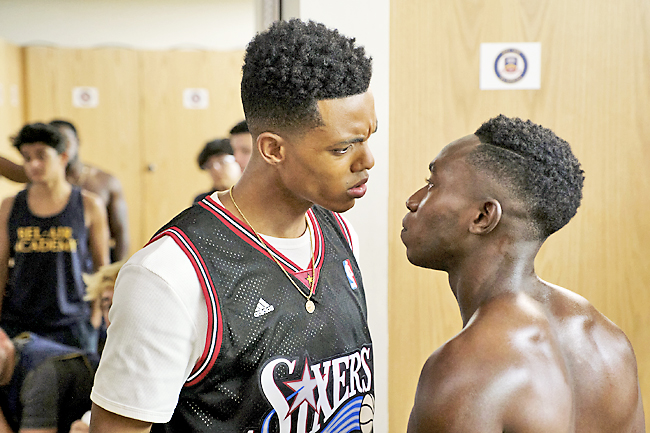Inkoo Kang
THE WASHINGTON POST – Like so many sitcom premises, the starting point of The Fresh Prince of Bel-Air is a traumatic upheaval. Its jaunty earworm of a theme song, rapped by series star Will Smith, glossed over the conceit’s darker, even Brontë-esque aspects: that of a teen abruptly uprooted from the only home he’s known; cut off almost entirely from his friends and close family; and sent off to live with distant, resentful relatives who had hoped they’d put everything he represents in the rearview mirror of their BMWs long ago.
A 2019 mock trailer by Morgan Cooper reimagined the classic comedy, which ran from 1990 to 1996, as a current-day indie drama, digging into the tensions writhing just under the surface of the show’s backstory. And now, with Smith’s blessing, that cheerless vision has become a 10-part TV drama, awash in gray light and antiseptic in its portrayal of sun-kissed, Californian luxury.
Suck all the joy, exuberance and wondrous charisma out of The Fresh Prince – a worthy launchpad for an actor who, in his prime, was widely considered the biggest movie star in the world – and you’re left with the gloomy and plodding Bel-Air. Not unlike the recent sequel series And Just Like That… this reboot eschews one of the most vital elements of its source material: its deftness in tackling difficult issues with a light, or at least tonally variable, touch.
The Fresh Prince centred episodes on racist cops and the Black class divide pretty much out of the gate, and it’s striking how contemporary much of the jokes and dialogue still feel three decades later. In contrast, a suffocating self-seriousness overhangs Bel-Air, reminding us how invaluable smart comedy can be in grappling with weighty concerns.
The new show opens somewhere The Fresh Prince seldom took us: Philadelphia. Unsurprisingly, the areas unexplored by the original series, and thus have no preexisting reference in our minds, are where Bel-Air thrives, as we see 16-year-old Will (Jabari Banks) bond with his devoted single mom (April Parker Jones) over their shared dream of getting him a basketball scholarship for college. But the court is also where the impetuous teen gets into a tiff with a local gangster, with whom Will ends up in jail overnight.

You know the rest. Once Will’s shipped off to the City of Angels, Cooper displays a knack for uncovering sources of conflict among his reinterpreted characters. With Uncle Phil (a trim Adrian Holmes) campaigning to become Los Angeles’s district attorney, Will’s immediately flagged – and treated – as a potential loose cannon.
Aunt Viv (Cassandra Freeman), an artist who gave up the easel upon starting a family, is dismayed that her firstborn, Hilary (Coco Jones), has dropped out of college and opted for a not-quite-career as a food influencer.
The bad blood between mother and daughter, introduced by Bel-Air, is the series’ only consistently engaging antagonism, in part because it strives to pull away from The Fresh Prince’s overwhelming male-centrism. But the update of Hilary from a proud ditz to an earnest and hypercompetent cook and commentator attuned to racism in the food world also exemplifies the reboot’s superficial and tiresome bids for social relevance.
Nowhere is that effort as apparent as with the new Carlton (Olly Sholotan), an oily, junior varsity Napoleon with a Xanax habit and an unrequited crush on classmate Lisa (Simone Joy Jones), a scholarship student at Bel-Air Academy he’ll soon compete with Will to win over. The brotherly rivalry between Smith and Alfonso Ribeiro’s cousins has been twisted into a harsh discord, adding to the show’s unrelenting gloom and strife. Not quite nighttime soap (a la Empire) nor compelling drama, Bel-Air, which ended up on Peacock after a bidding war between networks, is perhaps strongest as a testament to how much more TV execs seem to value a show’s marketability than its actual quality.
Banks has the unenviable task of filling Smith’s shoes, and although he’s capable of carrying the series, neither he nor anyone else in the cast – including Akira Akbar as Ashley and Jimmy Akingbola as “house manager” Geoffrey – gets much of a chance to shine in the first six episodes (the portion screened for review).
At least there’s no false advertising here; they removed the word “fresh” from the title.





